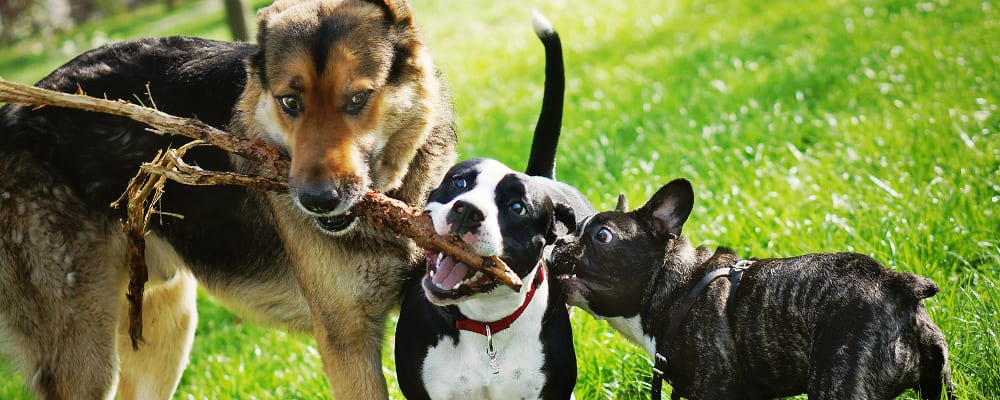
Don’t let your dog be a COVID dog! No, we don’t mean that your dog is going to get infected with COVID-19. Technically, there have been a few dogs that have been infected by their owners, but they never developed symptoms. What we want to focus on are the behavioral side effects of the pandemic, and why addressing anxiety in dogs and keeping them socialized is so important.
When the stay-at-home order started nearly a year ago, it was widely believed in the veterinary profession that dogs would get much more attention, exercise and training. Unfortunately, this did not turn out to be the case. While we understand that there is still work and school to be done, there is no commuting or traveling so there should be more “down time.” We’re happy to see more people welcoming dogs into their families, but as our patients come in for treatment, we can see that many of them are fearful, overweight, anxious, and generally ill-mannered.
The Keys to Keeping Dogs Happy and Healthy Post-Pandemic
An unfortunate fact of the pandemic is that many dogs are not getting the care and activity they need in their daily lives. Many have developed separation anxiety, which can be destructive for both the pet and its household. Here in the hospital, this translates to our team spending most of our appointment time trying to calm anxious dogs and show them that leaving the house doesn’t have to be scary.
Here are some of the most important things we recommend to help your dog live a happier, more stress-free life post-COVID:
Leash Training and Housebreaking
Make sure your pet is properly housebroken. Take them out at the same times every day for bathroom breaks, and reward them accordingly when they pick up on the routine. We urge our clients to incorporate obedience and leash training into their daily routines so their pets can learn good behavior and handle a leash without hassle.
Taking your dog out on a leash and giving them the opportunity to discover the world, get much needed exercise and potentially meet other dogs and people is so important for both their physical and mental well-being. Even if your dog does not need to be leashed at home, it will at the hospital so good leash manners are still necessary.
Crate Training
Crate training is important because it teaches puppies and dogs to grow accustomed to having alone time. What’s more, with proper training, your pet’s crate can become a secure place of refuge your dog can retreat to if they need peace and quiet. Without adequate crate training, dogs can become destructive and anxious, and have a much more difficult time being away from their owners, if even for just a few minutes.
Visits to the Dog Park
If there is a dog park in your neighborhood, don’t miss a chance to take your pup! Dog parks are the perfect place for people and their pets to meet and interact. Be sure to keep your dog current on vaccinations so it doesn’t catch any contagious diseases. Socializing is crucial for dogs and can help them build their confidence and learn how to behave better in public.
Toys and Playtime
Engagement toys keep dogs curious and mentally active. Simple food and treat puzzles can be a great diversion for your pup, especially if they need something to keep them distracted while you’re away for a little while. Establish regular play times each day to help your pet burn off energy and get some exercise.
COVID-19 Doesn’t Have to Have a Negative Impact on Our Pets
We understand that we all need to keep up with social distancing, but we are lucky enough to live in a less densely-populated area of the state where we can walk our dogs on trails, in parks, or even just around our neighborhoods without risking exposure to others. Even if dogs aren’t technically meeting others, they are being exposed to new sights, sounds and smells and getting exercise in the meantime (which is also very calming for nervous or anxious dogs).
Here at All Kinds Veterinary Hospital, we know that behavior is one of the biggest reasons dogs are relinquished to shelters. Trust us when we say that a little extra discipline, structure, and exercise will make your pup happier and more well-adjusted later! We hope that you and your family can successfully incorporate training and exercise into your dog’s daily routine and if you have questions, please give us a call at (301) 994-9919!
